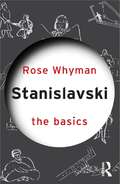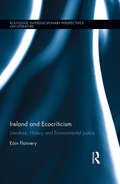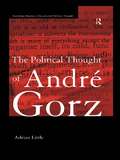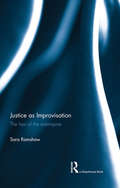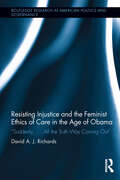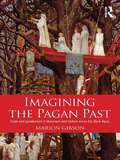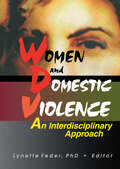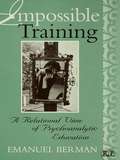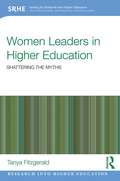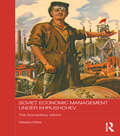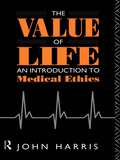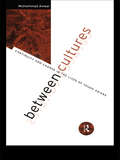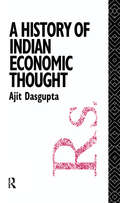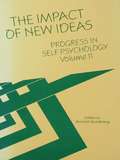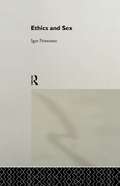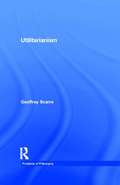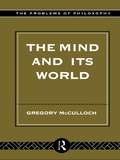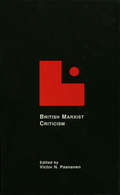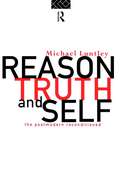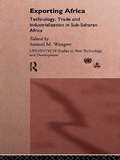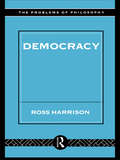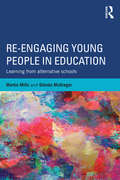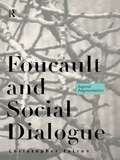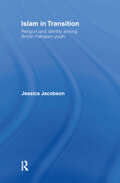Special Collections
Benetech’s Global Certified Accessible Titles
Description: Benetech’s GCA program is the first independent third-party EPUB certification to verify ebook accessibility. By creating content that is born accessible, publishers can meet the needs of all readers. Learn more: https://bornaccessible.benetech.org/
- Table View
- List View
Stanislavski
by Rose WhymanStanislavski: The Basics is an engaging introduction to the life, thought and impact of Konstantin Stanislavski. Regarded by many as a great innovator of twentieth century theatre, this book examines Stanislavski's: life and the context of his writings major works in English translation ideas in practical contexts impact on modern theatre With further reading throughout, a glossary of terms and a comprehensive chronology, this text makes the ideas and theories of Stanislavski available to an undergraduate audience.
Ireland and Ecocriticism
by Eóin FlanneryThis book is the first truly interdisciplinary intervention into the burgeoning field of Irish ecological criticism. Providing original and nuanced readings of Irish cultural texts and personalities in terms of contemporary ecological criticism, Flannery’s readings of Irish literary fiction, poetry, travel writing, non-fiction, and essay writing are ground-breaking in their depth and scope. Explorations of figures and texts from Irish cultural and political history, including John McGahern, Derek Mahon, Roger Casement, and Tim Robinson, among many others, enable and invigorate the discipline of Irish cultural studies, and international ecocriticism on the whole. This book addresses the need to impress the urgency of lateral ecological awareness and responsibility among Irish cultural and political commentators; to highlight continuities and disparities between Irish ecological thought, writing, and praxis, and those of differential international writers, critics, and activists; and to establish both the singularity and contiguity of Irish ecological criticism to the wider international field of ecological criticism. With the introduction of concepts such as ecocosmopolitanism, "deep" history, ethics of proximity, Gaia Theory, urban ecology, and postcolonial environmentalism to Irish cultural studies, it takes Irish cultural studies in bracing new directions. Flannery furnishes working examples of the necessary interdisciplinarity of ecological criticism, and impresses the relevance of the Irish context to the broader debates within international ecological criticism. Crucially, the volume imports ecological critical paradigms into the field of Irish studies, and demonstrates the value of such conceptual dialogue for the future of Irish cultural and political criticism. This pioneering intervention exhibits the complexity of different Irish cultural and historical responses to ecological exploitation, degradation, and social justice.
The Political Thought of Andre Gorz
by Adrian LittleAndre Gorz is one of the most important contemporary socialist thinkers. He has acquired a reputation as an iconoclastic theorist who poses radical questions about the future of the Left. This is the first full length assessment of his work which critically evaluates all of his writings from the 1950s to the 1990s.
Justice as Improvisation
by Sara RamshawJustice as Improvisation: The Law of the Extempore theorises the relationship between justice and improvisation through the case of the New York City cabaret laws. Discourses around improvisation often imprison it in a quasi-ethical relationship with the authentic, singular ‘other’. The same can be said of justice. This book interrogates this relationship by highlighting the parallels between the aporetic conception of justice advanced by the late French philosopher Jacques Derrida and the nuanced approach to improvisation pursued by musicians and theorists alike in the new and emerging interdisciplinary field of Critical Studies in Improvisation (CSI). Justice as Improvisation re-imagines justice as a species of improvisation through the formal structure of the most basic of legal mechanisms, judicial decision-making, offering law and legal theory a richer, more concrete, understanding of justice. Not further mystery or mystique, but a negotiation between abstract notions of justice and the everyday practice of judging. Improvisation in judgment calls for ongoing, practical decision-making as the constant negotiation between the freedom of the judge to take account of the otherness or singularity of the case and the existing laws or rules that both allow for and constrain that freedom. Yes, it is necessary to judge, yes, it is necessary to decide, but to judge well, to decide justly, that is a music lesson perhaps best taught by critical improvisation scholars.
Resisting Injustice and the Feminist Ethics of Care in the Age of Obama
by David A.J. RichardsDavid A. J. Richards’s Resisting Injustice and The Feminist Ethics of Care in The Age of Obama: "Suddenly,…All The Truth Was Coming Out" builds on his and Carol Gilligan’s The Deepening Darkness to examine the roots of the resistance movements of the 1960s, the political psychology behind contemporary conservatism, and President Obama’s present-day appeal as well as the reasons for the reactionary politics against him. Richards begins by laying out the basics of the ethics of care and proposing an alternative basis for ethics: relationality, which is based in convergent findings in infant research, neuroscience, and evolutionary psychology. He critically analyzes patriarchal politics and states that they are rooted in a reactionary psychology that attacks human relationality and ethics. From there, the book examines the 1960s resistance movements and argues that they were fundamentally oriented around challenging patriarchy. Richards asserts that the reactionary politics in America from the 1960s to the present are in service of an American patriarchy threatened by the resistance movements ranging from the 1960s civil rights movements to the present gay rights movement. Reactionary politics intend to marginalize and even reverse the ethical achievements accomplished by resistance movements—creating, in effect, a system of patriarchy hiding in democracy. Richards consequently argues that Obama’s appeal is connected to his challenge to this system of patriarchy and will examine both Obama’s appeal and the reactions against him in light of the 2012 presidential election. This book positions recent American political development in a broad analysis of the role of patriarchy in human oppression throughout history, and argues that a feminist-based ethics of care is necessary to form a more humane and inclusive democratic politics.
Imagining the Pagan Past
by Marion GibsonImagining the Pagan Past explores stories of Britain’s pagan history. These tales have been characterised by gods and fairies, folklore and magic. They have had an uncomfortable relationship with the scholarly world; often being seen as historically dubious, self-indulgent romance and, worse, encouraging tribal and nationalistic feelings or challenging church and state. This book shows how important these stories are to the history of British culture, taking the reader on a lively tour from prehistory to the present. From the Middle Ages to the twenty-first century, Marion Gibson explores the ways in which British pagan gods and goddesses have been represented in poetry, novels, plays, chronicles, scientific and scholarly writing. From Geoffrey of Monmouth to Edmund Spenser, William Shakespeare to Seamus Heaney and H.G. Wells to Naomi Mitchison it explores Romano-British, Celtic and Anglo-Saxon deities and fictions. The result is a comprehensive picture of the ways in which writers have peopled the British pagan pantheons throughout history. Imagining the Pagan Past will be essential reading for all those interested in the history of paganism.
Women and Domestic Violence
by Lynette FederYou can come to understand the nature, causes, consequences, and treatments for domestic violence!In reading Women and Domestic Violence: An Interdisciplinary Approach, you'll come to see the need for a more transdisciplinary attack on one of the world's greatest and most historically prevalent social crimes: spouse abuse. This collection of legal, psychological, criminological, and law enforcement approaches to this long-standing problem will expand your range of understanding and more directly focus your efforts to stamp out family abuse in your neighborhood.Overall, Women and Domestic Violence will show you how spousal abuse has damaged our society since the times of Homer, rocked our families since the colonists settled in America, and strained our prisons since the days of Julius Caesar. Also, more importantly, you'll explore current data regarding police handlings of domestic abuse calls and see what today's psychological literature is saying about the developments of this behavioral disorder. Specifically, you'll read about: the history of wife abuse the latest trends in civil legal relief an overview of how police deal with domestic violence calls the impact of batterer counseling on the frequency of domestic assault incidentsEveryone, including chiefs of police, family science educators, law professors, judges, and psychologists interested in stemming the rising tide of domestic assault occurrences will want to read Women and Domestic Violence. Its timely and up-to-date contents will help steer your community away from repeating history's shameful mistakes, and you'll find what you can do in your field to restore discipline and contentment to the families in your neighborhood.
Impossible Training
by Emanuel BermanOver the past century psychoanalysis has gone on to establish training institutes, professional societies, accreditation procedures, and models of education, thus bringing into uneasy alliance all three impossible pursuits. In Impossible Training: A Relational View of Psychoanalytic Education, Emanuel Berman turns his attention to the current status and future prospects of this daunting project. Berman is ideally suited to tackle the impossibility of psychoanalytic education. A graduate of two psychoanalytic institutes, one in Israel and one in America, he has devoted much of his professional life to psychoanalytic education and the organizational issues embedded in it. In Impossible Training, Berman describes the complex emotional and organizational dynamics of psychoanalytic training. Placing these issues within the context of major controversies in psychoanalytic history, he shows how generations of students have either idealized a "proper analytic identity," which evolves into a persecutory ideal, or rebelled against these standards. Are such persecuting and infantilizing trends inherent in analytic training, he asks, or can psychoanalytic education transcend them through changes in its structure and rules? For Berman, the relational and intersubjective trends in contemporary psychoanalysis call for changes in analytic supervision, not least of which is heightened attentiveness to the many relationships that gain expression in the supervisory process. Envisioned in this relational manner, supervision can become a more personal experience, less guarded, and more conducive to the development of a fertile transitional space between supervisor and supervisee. Anchoring his consideration of the present in the controversies of the past, Berman concludes by considering the mission of psychoanalytic educators today: to provide trainees with the resources to cope creatively with the as yet unknown challenges of tomorrow.
Women Leaders in Higher Education
by Tanya FitzgeraldLeadership in universities is physically, intellectually and emotionally demanding work. It involves multiple and complex tasks and responsibilities such as staff management, strategic management, operational planning, financial and resources management, policy development, quality assurance processes, improving student outcomes, and engaging with community and the professions/industry. Leadership is not simply the act of being a leader, it is the act of leadership that projects ‘success’ and ‘desirable’ attributes. Leadership has the capacity to be deeply seductive yet it is not an immediately attractive option for women, particularly for those who carry the burden of family and domestic responsibilities, for whom finding a space for leading is no easy task. Yet despite the almost pessimistic research evidence, women are in senior leadership positions in higher education, however precarious their numbers. There can be little doubt that universities benefit from diversity in their student and staff population This book addresses the central questions; Who are the women who survive and occupy elite leadership roles in universities? How might their leadership be shaped by and a consequence of institutional climate? What strategies do they learn and adopt and how do they lead and manage their female colleagues? What about those women who do not ‘fit’ the gender script? The chapters overview the changing policy landscape in higher education; provide a critical commentary on the interplay between gender, leadership, higher education, and organisational diversity, and draw on education and critical management literatures in order to offer a broader understanding of gender and elite leadership; This book will be essential reading for anyone involved or interested in higher education policy and management, academic leadership, organisational diversity and gender studies.
Soviet Economic Management Under Khrushchev
by Nataliya KibitaThe Sovnarkhoz Reform of 1957 was designed by Khrushchev to improve efficiency in the Soviet economic system by decentralising economic decision making from all-Union branch ministries in Moscow to the governments of the individual republics and regional economic councils. Based on extensive original research, including unpublished archival material, this book examines the reform, discussing the motivations for it, which included Khrushchev's attempt to strengthen his own power base. The book explores how the process of reform was implemented, especially its impact on the republics, and analyses why the reform, which was reversed in 1959, failed. Overall, the book reveals a great deal about the workings, and the shortcomings, of the Soviet economic system at its height.
The Value of Life
by John HarrisFirst published in 1985. Routledge is an imprint of Taylor & Francis, an informa company.
Between Cultures
by Muhammad AnwarBetween Cultures considers the position of young Asians in Britain in relation to education, employment, housing, the police and the responses they encounter from these institutions. It explores the cultural issues of family, marriage, religion and mother tongue, and the roles of Asian parents and the Asian community are analysed. Muhammad Anwar goes on to compare the situation of young Asians with that of young people generally, and to those in similar circumstances but with different backgrounds and religions.
A History of Indian Economic Thought
by Ajit K. DasguptaThe history of Indian economic thought provides rich insights into both economic issues and the workings of the Indian mind. A History of Indian Economic Thought provides the first overview of economic thought in the sub-continent. Arguing that it would be inappropriate to rely on formal economic analyses it draws on a wide range of sources; epics, religious and moral texts for the early period and public speeches, addresses, and newspaper articles for controversies from the nineteenth century onwards. What emerges is a rich mosaic reflecting India's different cultures and civilizations. Hinduism, Buddhism and Islam all address economic issues and British colonial rule had a deep impact, both in propagating Western economic ideas and in provoking Indian theories of colonialism and underdevelopment. The author concludes with chapters on Ghandian economics and on Indian economic thought since Independence.
Progress in Self Psychology, V. 11
by Arnold GoldbergVolume 11 begins with a timely assessment of self psychology and intersubjectivity theory, with original contributions by Carveth, Trop, and Powell, and a critical commentary by P. Ornstein. Clinical studies span the transferences, the complementarity of individual and group therapy, the termination phase, and multiple personality disorder. A special section of "dying and mourning" encompasses women professionals and suicide, the self psychology of the mourning process, and the selfobject function of religious experience with the dying patient. The volume concludes with theoretical and applied studies of personality testing in analysis, writer's block, "The Guilt of the Tragic Man," and the historical significance of self psychology. A testimony to the evolutionary growth of self-psychology, The Impact of New Ideas will be warmly welcomed by readers of the Progress in Self Psychology series.
Progress in Self Psychology, V. 10
by Arnold GoldbergThe tenth volume in the Progress in Self Psychology series begins with four timely assessments of the selfobject concept, followed by a section of clinical papers that span the topics of homosexuality, alter ego countertransference, hypnosis, trauma, dream theory, and intersubjective approaches to conjoint therapy. Section III, "A Dialogue of Self Psychology," offers Merton Gill's astute appreciation of "Heinz Kohut's Self Psychology," followed by commentaries by Leider and Stolorow and Gill's reply. The concluding section offers Stolorow and Atwood's "The Myth of the Isolated Mind," followed by discussions by Gehrie and the Shanes. A forum for the kind of spirited, productive exchanges that have long found a home within the self-psychological community, A Decade of Progress builds on the past in responding to the theoretical and clinical challenges of the present.
Ethics and Sex
by Igor PrimoratzEthics and Sex presents a systematic study of the nature and moral significance of human sexuality and of the major issues in sexual morality.The book is divided into two main parts. Part One gives a critical analysis of the key conceptions of human sexuality. Part Two discusses the most important issues in sexual morality: monogamy; adultery; prostitution; homosexuality; paedophilia; sexual harassment and rape.In this controversial and accessible book, the author demonstrates that many of the prohibitions that make up conventional sexual morality cannot withstand critical scrutiny.
Utilitarianism
by Geoffrey ScarreSurveying the historical development and the present condition of utilitarian ethics, Geoffrey Scarre examines the major philosophers from Lao Tzu in the fifth century BC to Richard Hare in the twentieth. Utilitarianism traces the 'doctrine of utility' from the moralists of the ancient world, through the Enlightenment and Victorian utilitarianism up to the lively debate of the present day. Utilitarianism today faces challenges on several fronts: it cannot warrant the drawing of adequate protective boundaries around the essential interests of individuals, and it does not allow them the space to pursue the personal concerns which give meaning to their lives. Geoffrey Scarre considers these and other charges, and concludes that whilst utilitarianism may not be a faultless moral doctrine, its positions are relevant, and significant today. Written with undergraduates in mind, this is an ideal course book for those studying and those teaching moral philosophy.
The Mind and its World
by Gregory McCullochFirst published in 1995. Routledge is an imprint of Taylor & Francis, an informa company.
British Marxist Criticism
by Victor N. PaananenBritish Marxist Criticism provides selective but extensive annotated bibliographies, introductory essays, and important pieces of work from each of eight British critics who sought to explain literary production according to the principles of Marxism.
Reason, Truth and Self
by Michael LuntleyMichael Luntley provides a lively introduction to the debate over postmodernism. Sympathisers of the postmodernist critique of absolute knowledge have jetisoned concepts of reason,t ruth and self; this abandonment has fuelled their opponents' case against postmodernism. This has led them to ignore the very real problems raised by the postmodernists. Luntley offers a clear and careful exposition of how rational debate survives despite the Enlightenment's failings. Reason, Truth and Self covers many of the key questions of our age: * How rational is science? * Can we really know the truth about ourselves and the world? * What is the nature of the mind? * Can we know the difference between right and wrong? Reason, Truth and Self is ideal for courses in philosophy and the social sciences.
Exporting Africa
by Samuel M. WangweExporting Africa explains how firms, which have developed export trade in Sub-Saharan economies, have been able to sustain their competitiveness in the face of rapid technological change in the international economy: in short, how they deal with the threats and the promises which rapid technological changes present to Africa. The papers present new empirical research and an innovative conceptual framework.
Democracy
by Ross HarrisonDemocracy surrounds us like the air we breath, and is normally taken very much for granted. Across the world democracy has become accepted as an unquestionably good thing. Yet upon further examination the merits of democracy are both paradoxical and problematic, and the treasured values of liberty and equality can be used to argue both for and against it.In the historical section of the book, Ross Harrison clearly traces the history of democracy by examining the works of, amongst others, Plato and Aristotle, Hegel and Marx. Informed by facts and detailed knowledge of these famous thinkers, Harrison provides a clear and cogent justification of democracy.
Re-engaging Young People in Education
by Martin Mills and Glenda McGregorMany young people failed by the school system are those who face a range of social and economic challenges due to multiple forms of injustice. This book provides an insight into the educational practices that work to re-engage young people who have become disenchanted with traditional schooling. It examines the lives of students and workers who participate in education sites on the fringes of mainstream education, and includes a rich tapestry of personal experiences from those who have been failed by their schooling experiences. The book draws upon research of international relevance conducted in a range of ‘Flexible Learning Centres’ and ‘democratic schools’ in Australia and the UK; it suggests that improving the retention levels of young people in formal education will require schooling practices to change. Students who have become disengaged from mainstream schooling do re-engage in the learning process of many alternative schools, indicating that teaching practices and forms of organisation which work in alternative sites can also provide lessons for mainstream schooling, thereby encouraging a more socially just education system.Included in the book: contexts of contemporary schooling who chooses flexible learning centres and why democratic schools: students and teachers working together teaching in ‘the margins’ case studies: ‘oppositional alternatives’. All young people have the capacity to learn and to enjoy learning; they do not ‘fail school’, rather, schools fail them. The teachers, workers and students who have shared their stories provide significant insights into how we might change this situation, and the book will be invaluable reading for postgraduates and researchers in the fields of education, the sociology of education, school reform and social work.
Foucault and Social Dialogue
by Chris FalzonFoucault and Social Dialogue; Beyond Fragmentation is a compelling yet extremely clear investigation of these options and offers a new way forward. Christopher Falzon argues that the proper alternative to foundationalism is not fragmentation but dialogue and that such a dialogical picture can be found in the work of Michel Foucault. Such a reading of Foucault allows us to see, for the first time, the ethical and political position implicit in Foucault's work and how his work contributes to the larger debate concerning the death of man.
Islam in Transition
by Jessica JacobsonIslam in Transition focuses on the ways in which Islamic religion still engenders powerful loyalties within what is now a predominantly secular society and how, in their continual adherence to their religion, many young British Pakistanis find a welcome sense of stability and permanence. By presenting material collected in field-work study and by using extensive quotations from interviews, the author argues that in a world where concepts of identity are always being challenged traditional sources of authority and allegiance still survive.
